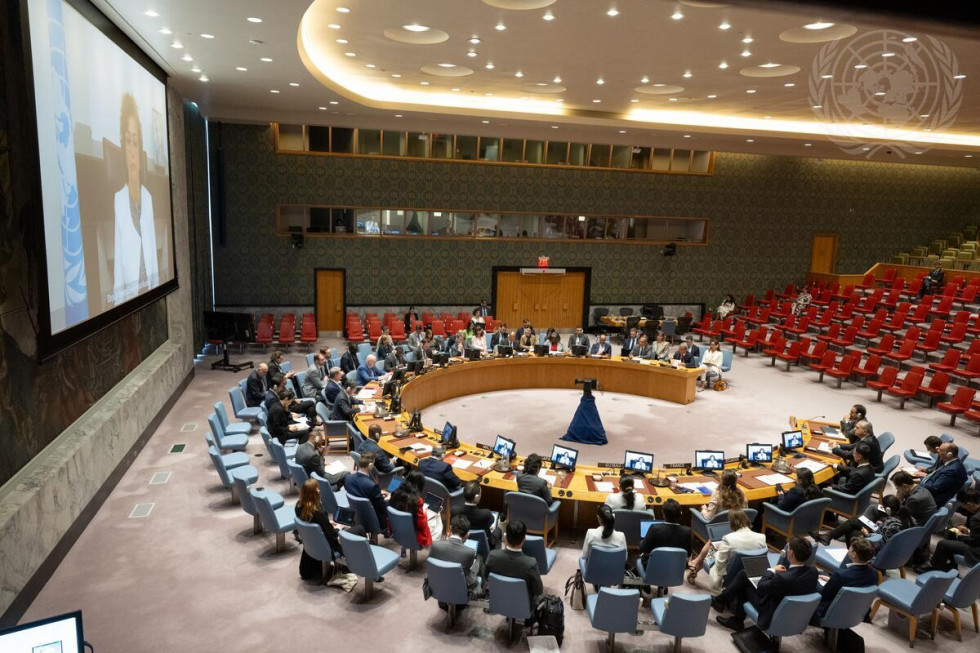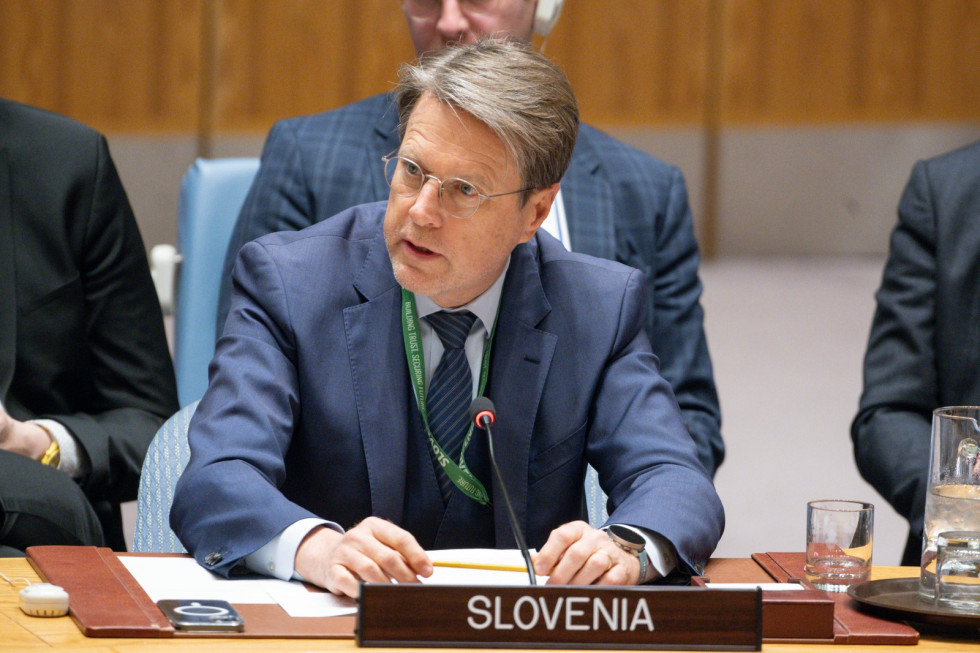Highlights of Slovenia's activities in the UN Security Council in June 2024
Sudan was again at the forefront, with the adoption of a resolution calling for an immediate cessation of hostilities and de-escalation of the situation in and around El Fasher. Eight resolutions were adopted by the UN Security Council (UNSC) during the month.
By adopting a US-drafted resolution on a lasting peace in Gaza, the UNSC endorsed a ceasefire proposal calling on both Israel and Hamas to implement the provisions of Resolution 2735 immediately and unconditionally. Slovenia has consistently called for strict respect for international law, including international humanitarian and human rights law. In its intervention, Slovenia reiterated its call for an immediate ceasefire and stressed that peace can only be achieved by two sovereign and equal states, which is why Slovenia recognises Palestine as an independent and sovereign state.
The UNSC discussed the recent detention of 13 UN staff members and several NGO workers by the Houthis. Slovenia joined the UK and 38 other UN members in a joint press statement before the start of the debate, calling for the immediate and unconditional release of the UN, NGO and diplomatic staff. At the end of June, the UNSC adopted Resolution 2739, which extends the monthly reporting requirement for the Secretary-General on Houthi attacks in the Red Sea.
In June, the UNSC discussed the humanitarian situation in Ukraine. Slovenia once again drew attention to the destruction of civilian infrastructure, the deterioration of the humanitarian situation and the increase in the number of internally displaced persons. At the briefing on arms supplies to Ukraine requested by Russia, Slovenia stressed the principle of self-defence, assistance based on Article 51 of the UN Charter and the unacceptability of supplying arms to Russia in violation of UNSC resolutions (DPRK equipment). Slovenia, together with the US, requested a briefing to provide information on the discussions at the Summit on Peace in Ukraine held in Switzerland.
In Resolution 2736, the UNSC demanded that the RSF paramilitary group halt the siege of the town of El Fasher, the capital of the North Darfur state, and called for an immediate end to the fighting and de-escalation in and around El Fasher. Slovenia called on the parties to prioritise the protection of civilians and to strictly respect their obligations under international humanitarian and human rights law.
At the UNSC’s quarterly meeting on Afghanistan, Slovenia underlined that the plight of Afghan women is the starkest example of ongoing repression and that restrictive policies on the human rights of women and girls should be rescinded. Slovenia also expressed its strong support for the peace process in Afghanistan with a strengthened role of the United Nations, ensuring the participation of women.
The UNSC discussed the human rights situation in the Democratic People's Republic of Korea (DPRK). Slovenia condemned the long-standing, grave and repeated systematic violations of human rights in the DPRK and stressed the importance of accountability for this situation. Slovenia also called on the DPRK to put an end to its isolationist policy and to allow the UN and humanitarian workers to carry out their work. At the end of the month, the UNSC also met to discuss the threat posed by DPRK’s missile tests.
The UNSC held its annual open debate on children and armed conflict. The 2023 UN report verified a record of 32,990 grave violations against 22,557 children. These alarming figures represent the highest number of violations recorded on an annual basis for almost a decade. Slovenia highlighted the situations in Sudan, Palestine, Israel, Myanmar, Ukraine, Afghanistan and Haiti, which require the immediate attention of the international community.
The UNSC also held an open debate on cybersecurity. Slovenia stressed that the Security Council, as the body responsible for the maintenance of international peace and security, must play a decisive role in defusing tensions in the event of cyber activities that threaten international peace and security.
The UNSC adopted a resolution extending the mandates of the Ombudsperson and the Monitoring Team of the 1267 ISIL/Da’esh and Al-Qaida sanctions regime for 36 months, and a resolution extending the mandate of UNDOF until the end of 2024. At the end of the month, the UNSC also adopted a resolution renewing the DRC sanctions regime and the mandate of the Group of Experts, a resolution extending the authorisation of the AU Transition Mission in Somalia, and a resolution on the International Residual Mechanism for Criminal Tribunals.
On 6 June, the General Assembly elected the new non-permanent members of the UNSC for the 2025–2026 term: Denmark, Greece, Pakistan, Panama and Somalia, replacing Ecuador, Japan, Malta, Mozambique and Switzerland.



